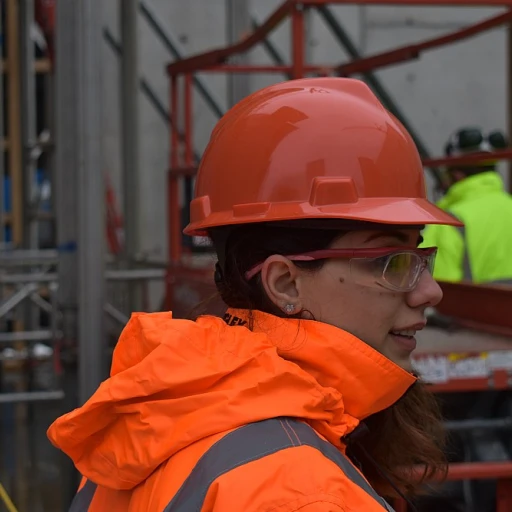The Evolving Job Market at Lawrence University
Adapting to Changes in Employment at Lawrence University
The job market at Lawrence University in Appleton, WI, is witnessing a dynamic transformation, mirroring a broader trend seen in higher education institutions worldwide. This evolution is shaped by numerous factors, including technological advancements, the growing emphasis on sustainability, and the ongoing drive for diversity and inclusion within the academic community.
As Lawrence University adapts to these changes, it has begun to offer a range of unique career opportunities aimed at accommodating these emerging expectations. For instance, positions such as job listing managers, administrative assistants, and associate directors are integral to keeping the university operating smoothly. These roles require individuals who are able to manage varying responsibilities, from assisting in daily operations to supporting strategic initiatives.
Furthermore, the institution values the presence of skilled professionals in specialized domains like project coordination and construction project management. These roles are crucial as the university embarks on physical and infrastructural advancements, ensuring that safety, security, and efficiency are prioritized. In athletics, roles such as the lacrosse coach and assistant directors of men’s sports programs are pivotal in fostering talent and promoting teamwork among Lawrence students.
The shift towards remote work and flexibility also forms a significant chapter in this evolving narrative. Lawrence University recognizes the need for adaptable work models that benefit both the university staff and its student community. This development aligns with the global trend of increasing remote work opportunities, as many educational institutions rethink traditional work environments.
In this climate, skills such as leadership, effective communication, and technical proficiency are becoming increasingly desirable. For those seeking more personalized guidance on navigating this evolving job market, insights can be found in resources like
Personalized Guidance with mri Global's Small Business Experts, which provide targeted advice and strategies.
Overall, the evolving job market at Lawrence University is a testament to its commitment to fostering career development and creating an inclusive, dynamic work environment that prepares both staff and students for future success.
Key Skills for Future Employment
Developing In-Demand Skills for University Jobs
In the ever-changing job market, particularly in academia, it's essential to identify and develop key skills that will ensure success in future employment. Lawrence University in Appleton, WI, is a dynamic space where students and community members alike can prepare for the evolving landscape of university jobs.
As the demand for specialized roles such as assistant directors, administrative assistants, and operations managers increases, both students and staff at Lawrence University can benefit from honing their skills in specific areas:
- Communication and Leadership Skills: Vital for roles like an assistant director or project coordinator, clear communication fosters strong team dynamics and effective leadership in athletics departments or during construction projects.
- Technical Proficiency: With technology permeating every aspect of university operations, familiarity with digital tools is crucial. Whether you are managing safety and security operations or involved in HVAC systems as a technician, technical skills remain indispensable.
- Adaptability and Problem Solving: A key skill set for careers like that of a director in sports and athletics or an associate director handling university operations as these positions often require innovative solutions and adaptability in a fast-paced environment.
- Project Management: Essential for roles such as an operations manager or project coordinator, project management skills facilitate the seamless progression of university initiatives.
The pace at which technology is reshaping university jobs means that continuous learning and skill development are more significant than ever. By prioritizing these areas, individuals can make themselves attractive candidates in the competitive job market. For further insights on how to adapt to these changes, check out
navigating the future of IT recruitment with Modis.
Technology's Role in Shaping University Jobs
The Impact of Technology in University Employment Landscape
The technological evolution continues to redefine the employment landscape at Lawrence University in Appleton, WI. As educational institutions embrace innovation, new roles and employment models are emerging, preparing Lawrence students for the rapidly changing future of work.
Technology plays a crucial role in shaping various jobs at the university. Whether it's through facilitating advanced teaching methods or enhancing operational effectiveness, the integration of digital tools is evident across multiple domains.
- Academic and Administrative Roles: The need for positions such as administrative assistant, project coordinator, and operations manager is intensifying. These roles are increasingly leveraging technology to streamline processes and optimize performance.
- Technological Skill Sets: As more tasks become automated or digitalized, there’s a growing demand for skills related to system management and digital literacy among assistant and director roles in academic and sports departments, like those assisting the athletics director or the director sports.
- Enhanced Infrastructure: With the expansion of technology infrastructure at Lawrence University, roles such as HVAC technician and safety security officer are becoming more complex and require a solid understanding of new systems and technology-enabled solutions.
Lawrence University’s commitment to advancing technology not only fosters job creation but also ensures a dynamic work environment. Positions like associate director or assistant director in various departments further highlight the importance of technology in governance and leadership roles.
For a deeper dive into how universities can ensure equitable access to resources and opportunities, check out this
exploring equity in learning resource. It provides insights into how technology can bridge gaps in educational environments, further benefiting university community members from students to administrators.
Remote Work and Flexibility at Lawrence University
The Rise of Remote Work and its Benefits
The shifting landscape of work has seen a significant embrace of remote work, and Lawrence University is no exception. This adaptive approach has opened doors for many and created opportunities that were previously limited by geographical constraints. The Appleton community has witnessed how the integration of remote jobs across the campus has transformed traditional roles, offering more flexibility and inclusivity.
Remote work has allowed individuals such as administrative assistants, operations managers, and job coaches to efficiently manage their responsibilities without the constraints of physical presence. This shift has been particularly beneficial in roles involving digital communication and program coordination. For instance, project coordinators and assistant directors at the university have harnessed technology to optimize their workflows and communication, leading to improved efficiency.
Enhancing Work-Life Balance for Lawrence Students and Faculty
Remote work has granted the Lawrence community, from students to senior staff such as the athletics director and operations associate, a better chance at achieving a work-life balance. This flexibility is particularly valuable for instructor-led positions such as coaches, including those responsible for men’s lacrosse. Balancing field work and paperwork becomes more manageable when some tasks can be done remotely. This hybrid model not only supports Lawrence students but also allows university staff to engage more deeply in campus activities and participate in external career development opportunities.
The implementation of remote work also supports operational roles in departments like safety, security, and construction projects by offering a flexible schedule that can increase job satisfaction and retention. As an example, jobs such as that of the HVAC technician or head of sports operations have seen operational adjustments thanks to technology, resulting in more effective management of tasks in real-time.
Lawrence University’s approach to remote work showcases its commitment to equipping its workforce with the tools needed to thrive in an evolving job market. This not only enhances the university’s reputation as an adaptive and inclusive employer but also aligns with the broader trend toward sustainable job creation and diversity in the workplace.
Sustainability and Job Creation
Creating Sustainable Career Paths
As the global focus shifts towards sustainability, Lawrence University in Appleton, WI is actively exploring how this trend can be integrated into its job market. The university's commitment to sustainability translates into job creation and enhancement, making it an appealing destination for both current and prospective employees who value eco-friendly practices.
Incorporating sustainability does not simply mean adding more green-friendly job positions, but it involves embedding sustainability into various roles across the board. For instance, a construction project manager at Lawrence University may be tasked with ensuring that all new buildings adhere to environmentally friendly standards. This not only fosters a sustainable campus environment but also aligns with the institution's broader goals in community development.
Moreover, sustainability affects the kind of skills required for future employment at the university. Careers like an HVAC technician or an operations manager will increasingly focus on energy-efficient technologies and sustainable practices. Such roles will demand unique skill sets capable of balancing technical proficiency with eco-conscious strategies.
The university's emphasis on sustainability also reflects its broader commitment to the community, including students and faculty involved in sustainability initiatives. For example, an administrative assistant may find their role evolving to coordinate projects that support the university's green goals, enhancing their career trajectory while contributing to a more sustainable future.
In the competitive landscape of university jobs, promoting sustainable practices aligns with the ethics of upcoming generations, particularly Lawrence students who value environmental responsibility. Positions such as the athletics director can also integrate sustainable practices into their operations, setting benchmarks for other institutions.
The shift towards sustainability isn't solely about new job listings; it's about a comprehensive approach that influences leadership and innovation. It is this forward-thinking approach that allows Lawrence University to create fertile ground for sustainable job development, preparing its community for the burgeoning green economy that lies ahead.
Diversity and Inclusion in the Workplace
Promoting an Inclusive Work Environment
The landscape at Lawrence University has evolved to place a significant emphasis on diversity and inclusion within the workplace. As the job market continues to expand both in the Appleton community and beyond, fostering an environment where every individual feels valued and supported is crucial for elevating job satisfaction and retention among faculty and staff.
In today's professional setting, roles like assistant director, operations manager, or even a lacrosse coach go beyond technical capabilities by requiring a deep understanding and appreciation of multicultural dynamics. By nurturing a culture of inclusivity, Lawrence University taps into the diverse insights and experiences brought by a broad spectrum of individuals, which in turn fosters innovation and community growth.
Building an inclusive space is not solely limited to hiring practices but extends to how jobs are structured and how support is offered to everyone, from early career professionals like lawrence students to senior roles like assistant or associate directors. Whether as project coordinators in operations or pursuing an administrative assistant position in the athletics director's office, employees are encouraged to bring their whole selves to work.
Ensuring this inclusive approach aligns with the broader job trends highlighted throughout the article, where skills in communication, empathy, and cultural competence are increasingly pivotal. This approach helps not only in creating new job opportunities but also aligns with Lawrence University's commitment to sustainability and ethical practices in creating a more engaged and motivated workforce.
From construction projects to roles focused on safety, security, and even HVAC technician positions, the varied professional tracks available at Lawrence University each contribute uniquely to an inclusive institution. These efforts are modeled from top down leadership annual reviews to individual job listings, each reflecting a commitment to diversity and inclusion in every facet of the workplace.
As the role of technology grows and remote work options expand, the necessity for diversity and inclusion becomes even more pronounced in ensuring successful adaptation and integration across all dimensions of the university's operations.














